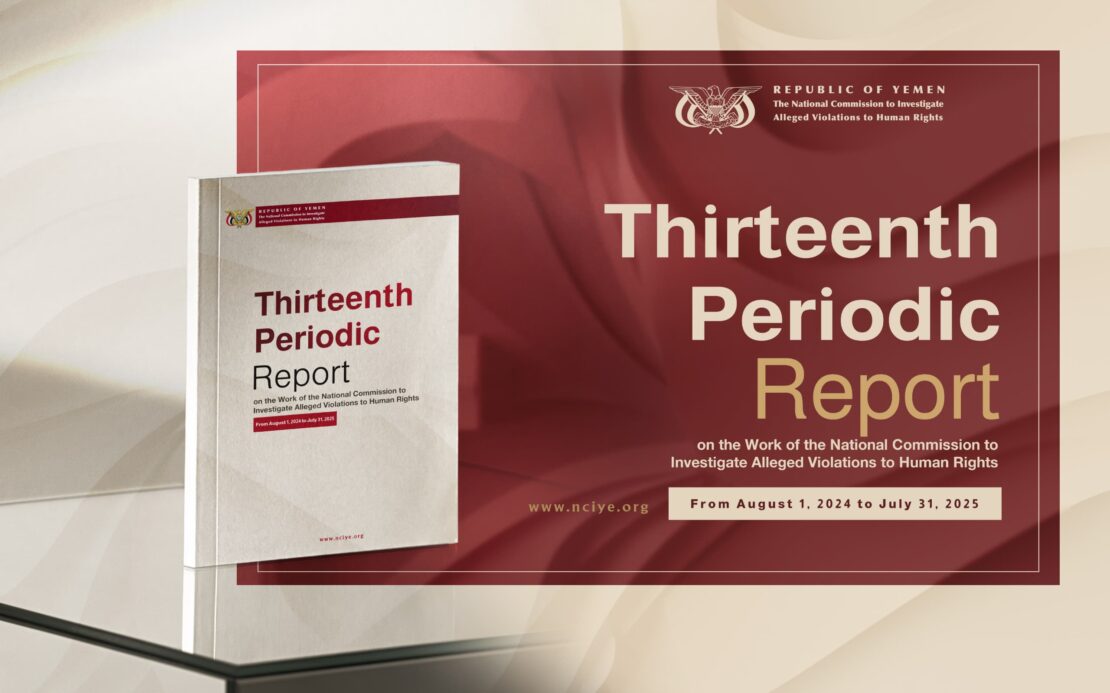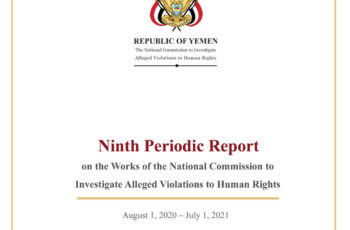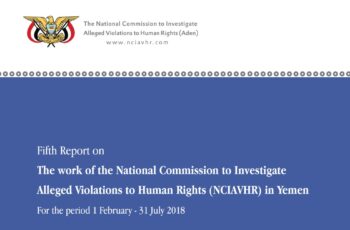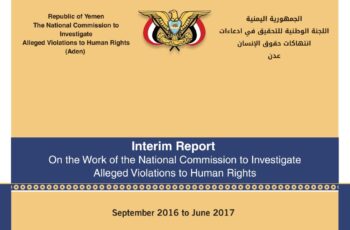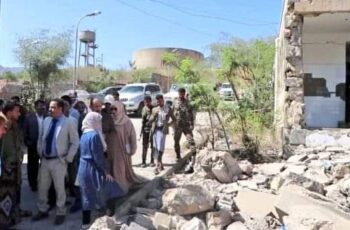NCIAVHR Launches 13th Periodic Report on Human Rights Violations in Yemen
Aden | September 4, 2025
The National Commission to Investigate Alleged Violations of Human Rights (NCIAVHR) today, Wednesday, released its 13th periodic report, covering the period from August 1, 2024, to July 31, 2025.
The report documented 3,003 incidents of violations affecting 3,766 victims of both sexes, including women and children, across various Yemeni governorates. With this release, the total number of violations documented by the Commission since its work in January 2016 has reached 32,953 incidents, involving 67,538 victims.
According to the report, this period unfolded within a complex political and security context. More than ten years have passed since the Houthis took control of the capital Sana’a. At the same time, the non-international armed conflict has continued amid an undeclared truce since 2022 that halted coalition airstrikes. The period also coincided with the designation of the Houthis as a terrorist organization by the United States and was marked by significant economic and security repercussions, including rising attacks on commercial shipping in the Red Sea, a decline in oil revenues, and the deterioration of the national currency.
Despite these challenges, the Commission’s teams maintained their presence in the field. During this period, they listened to 13,192 witnesses and victims, reviewed 7,768 documents, medical and security reports, and photographic evidence, and carried out field visits to front-line areas and detention centers in Aden, Hadramawt, Marib, and Shabwah, as well as to affected districts such as Hayfan in Taiz and Al-Musaymir in Lahj, where hundreds of incidents were documented. The Commission also organized specialized hearings for landmine victims, journalists, and torture survivors, in line with its commitment to ensuring victims’ participation in the justice process and safeguarding their rights.
The report noted that among the most serious violations during the reporting period were 817 incidents of civilian killings and injuries, which resulted in 297 deaths, including 43 children and 21 women, and 693 injuries, including 149 children and 70 women. Civilian deaths were attributed to the Houthis in 226 cases, along with 592 injuries, while government forces and coalition airstrikes were responsible for 48 deaths and 74 injuries. U.S. and Israeli airstrikes accounted for 13 deaths and 12 injuries. The Commission also documented 206 cases of child recruitment, all perpetrated by the Houthis, and recorded 147 incidents of anti-personnel landmine explosions, which caused the deaths of 36 civilians, including 4 women and 8 children, and injured 101 others, including 3 women and 21 children—all attributed to the Houthis.
The Commission further confirmed four incidents of attacks against medical facilities and staff, all committed by the Houthis. It also recorded 96 cases of forced displacement, 93 of which were committed by the Houthis, with three cases involving shared responsibility among parties to the conflict. In addition, the report documented 79 extrajudicial killings, of which 33 were attributed to the Houthis and 12 to government forces and security bodies. In the area of liberty and personal security, 695 cases of arbitrary detention and enforced disappearance were recorded, including 509 attributed to the Houthis and 186 to government forces. The Commission also documented 41 cases of torture and ill-treatment, 33 of them perpetrated by the Houthis and 8 by government forces. Regarding property violations, the report listed 13 incidents of home demolitions, all committed by the Houthis, and six attacks on freedom of expression, five attributed to the Houthis and one to government forces.
The report also highlighted airstrikes by U.S., British, and Israeli forces in March and May 2025 that struck civilian sites in Houthi-controlled areas, including Sana’a Airport, Amran Cement Factory, and other vital facilities, which resulted in dozens of civilian deaths and injuries. The Commission noted that its investigations into these incidents remain ongoing.
It stressed that women have borne a disproportionate burden of the conflict, through detention, displacement, gender-based violence, and discriminatory restrictions on their mobility and right to public participation.
The report also outlined the challenges facing documentation, investigation, and accountability efforts during this period, including restrictions on access to victims and witnesses, the shrinking of civic space—especially in areas controlled by the Houthis—and the limited resources available to expand monitoring and documentation activities.
Nevertheless, the Commission enhanced its cooperation with national authorities through meetings with the Presidential Leadership Council, several ministers, and governors. It also participated in international meetings with European Union missions, the U.S. Embassy, and the Arab Group at the Human Rights Council, and presented its findings at events held at the United Nations in Geneva.
The Commission concluded its report with a series of recommendations, calling on all parties to the conflict to immediately cease violations, comply fully with international humanitarian and human rights law, end all forms of abuses against civilians, ensure their full protection, enable victims to access justice and redress, cooperate with the Commission to ensure the success of its mandate, and take its findings seriously as an independent national accountability mechanism.
It further urged the Yemeni government to strengthen judicial independence and effectiveness, release detainees held outside the law, ensure the regular payment of salaries, integrate armed and security groups under the Ministries of Defense and Interior, and protect the right of citizens to peaceful protest. The Houthis, meanwhile, were called upon to end all forms of violations, lift discriminatory restrictions on women, release detainees and the forcibly disappeared, end punitive economic measures against civilians, halt child recruitment, lift the siege on Taiz, clear landmines and disclose their maps, and ensure the protection of women and children.
Finally, the Commission appealed to the international community to implement Human Rights Council Resolution A/HRC/RES/57/37 and Presidential Decree No. 20 of 2025 extending the Commission’s mandate for three additional years, to secure navigation in the Red Sea, and to maintain diplomatic pressure for the immediate and unconditional release of UN and international NGO staff detained in Houthi-controlled areas.
The Commission emphasized that its 13th report represents a new reference document in the record of national investigations, reflecting its unwavering independence and impartiality, and reaffirming its role as the voice of victims and a mechanism to promote justice and prevent impunity.
The full report is available on the Commission’s website:
🔗 [https://www.nciye.org/reports/ThirteenthReport/ThirteenthReport-en.pdf]
For media inquiries or interview requests with the Commission’s English spokesperson:
📧 marwah_saleh@nciye.org

